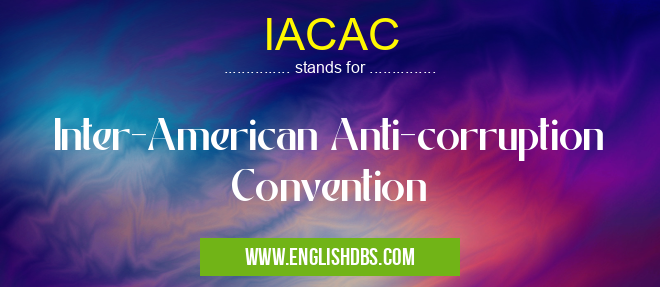What does IACAC mean in LAW & LEGAL
Inter-American Anti-corruption Convention (IACAC) is a comprehensive agreement adopted by the member states of the Organization of American States (OAS) to combat corruption in the Americas. It is the first international treaty specifically designed to address corruption, and it has been a key tool in the fight against this scourge in the region.

IACAC meaning in Law & Legal in Governmental
IACAC mostly used in an acronym Law & Legal in Category Governmental that means Inter-American Anti-corruption Convention
Shorthand: IACAC,
Full Form: Inter-American Anti-corruption Convention
For more information of "Inter-American Anti-corruption Convention", see the section below.
Key Provisions
The IACAC establishes a framework for cooperation among OAS member states to:
- Prevent and combat corruption: States are required to implement comprehensive measures to prevent and combat corruption, including criminalizing a wide range of corrupt practices.
- Strengthen legal frameworks: States must adopt legislation that complies with the Convention's standards, including provisions on asset recovery, witness protection, and whistleblower protection.
- Promote transparency and accountability: States are encouraged to promote transparency and accountability in public administration, including measures to increase public access to information and to strengthen internal controls.
- Establish mechanisms for cooperation: The Convention establishes mechanisms for cooperation among OAS member states, including the creation of a network of national anti-corruption authorities and a forum for sharing best practices.
Implementation
Since its adoption in 1996, the IACAC has been implemented through a variety of mechanisms, including:
- Technical assistance: OAS provides technical assistance to OAS member states to help them implement the Convention's provisions.
- Capacity building: OAS provides training and other capacity building activities to strengthen the abilities of OAS member states to combat corruption.
- Monitoring and evaluation: OAS monitors and evaluates the implementation of the Convention through a variety of mechanisms, including periodic reports from OAS member states.
Outcomes
The IACAC has had a significant impact on the fight against corruption in the Americas. It has helped to:
- Raise awareness: The Convention has raised awareness of the problem of corruption and has helped to mobilize political will to address it.
- Strengthen legal frameworks: The Convention has helped OAS member states to strengthen their legal frameworks to combat corruption.
- Increase cooperation: The Convention has facilitated cooperation among OAS member states in the fight against corruption.
- Reduce corruption: The Convention has contributed to a reduction in corruption in the Americas.
Essential Questions and Answers on Inter-American Anti-corruption Convention in "GOVERNMENTAL»LAW"
What is the Inter-American Anti-corruption Convention (IACAC)?
The IACAC is an international treaty that aims to prevent, detect, punish, and eradicate corruption in the Americas. It was adopted in 1996 by the Organization of American States (OAS) and has been ratified by 34 countries. The IACAC establishes a set of binding obligations for its parties, including measures to criminalize corruption, enhance transparency, and strengthen international cooperation in the fight against corruption.
What are the key provisions of the IACAC?
The IACAC includes provisions on various aspects of corruption, such as:
- Criminalization of acts of corruption, including bribery, embezzlement, trading in influence, and money laundering
- Measures to promote transparency and accountability in public administration
- Establishment of mechanisms for international cooperation in the prevention and detection of corruption
- Provisions for the recovery of assets obtained through corruption
- Measures to protect whistleblowers and victims of corruption
What is the role of the OAS in implementing the IACAC?
The OAS plays a crucial role in promoting and monitoring the implementation of the IACAC. The OAS provides technical assistance to its member states in implementing the Convention, conducts periodic reviews of their progress, and facilitates cooperation among them in the fight against corruption.
How has the IACAC contributed to the fight against corruption in the Americas?
The IACAC has been instrumental in strengthening legal frameworks and institutional capacities to combat corruption in the Americas. It has helped to raise awareness about the harmful effects of corruption, promote good governance practices, and foster cooperation among countries in the region. The IACAC has also contributed to the recovery of stolen assets and the protection of whistleblowers and victims of corruption.
What are the challenges in implementing the IACAC?
Implementing the IACAC effectively can be challenging due to a number of factors, including:
- Political resistance to anti-corruption measures
- Lack of resources and capacity
- Cultural and societal factors that may tolerate or even encourage corruption
- Weak institutions and ineffective enforcement mechanisms
Final Words: The IACAC is a key tool in the fight against corruption in the Americas. It has helped OAS member states to strengthen their legal frameworks, increase cooperation, and raise awareness of the problem of corruption. As a result, the Convention has contributed to a reduction in corruption in the region.
